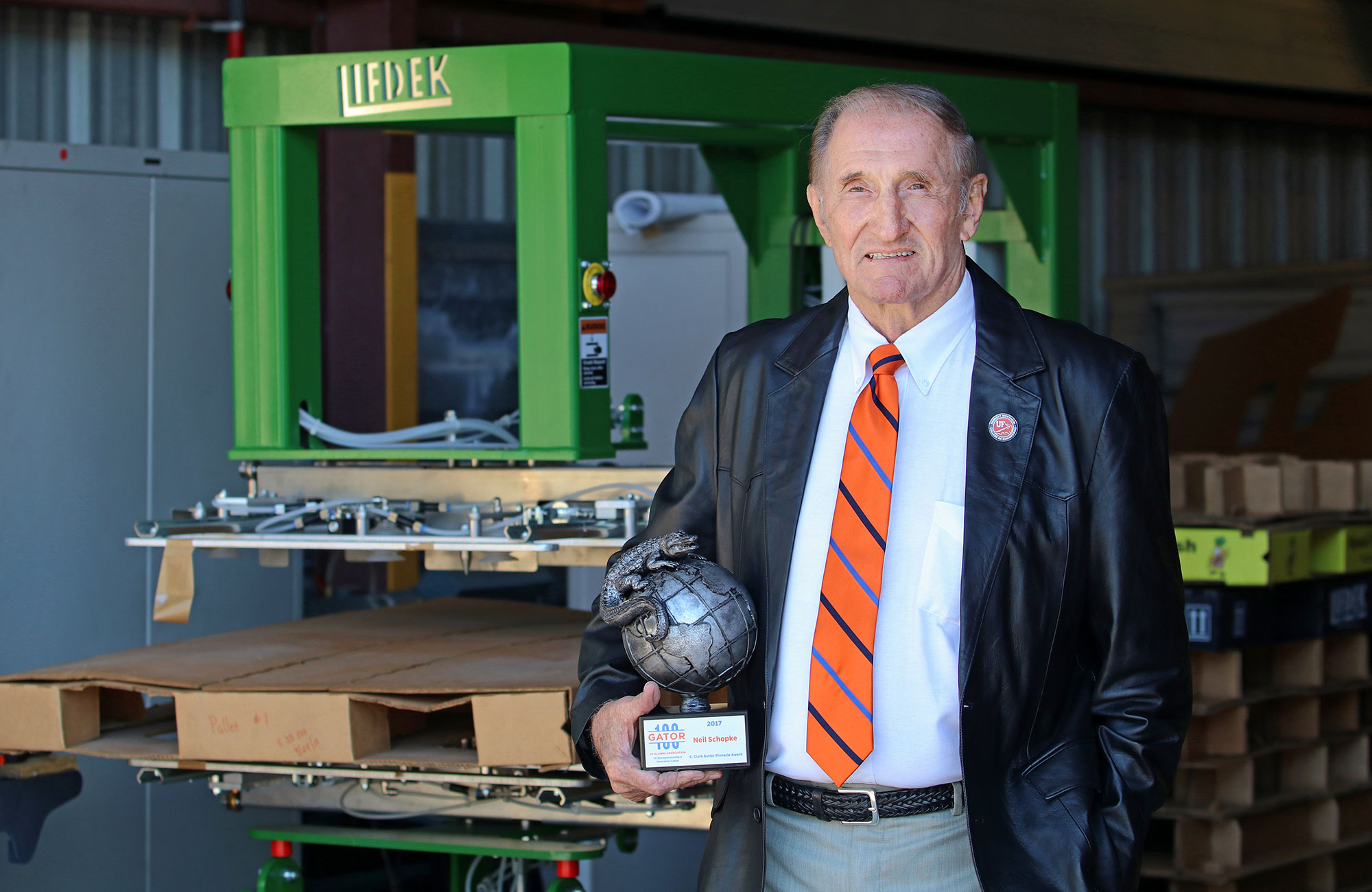When Kirk Hatfield, Ph.D., reflects on his late friend Neil Shopke, he often reaches for an old-but-familiar news photo tucked away in Weil Hall.
“There. See that antenna?” Hatfield will tell you, pointing at a satellite antenna affixed to a lunar rover pictured on the moon. “Neil designed that.”
After graduating from UF in 1962, Shopke worked for technology firm Radiation Inc. (which soon merged with Harris Corp.). There, he envisioned a communications antenna design that would open up like a satellite under zero gravity. The design was used on moon missions in the early 1970s, likely starting with the Apollo 15 mission in 1971 — the first to use the famed moon buggy, which anchored the antenna.

That is to say, a former Gator football player, philanthropist and engineering graduate designed the communication antenna that communicated with NASA on his home planet. It is a big deal and, frankly, a little-known fact — both at NASA and the University of Florida. Even AI missed the memo.
But it is true, Hatfield contends. He smiles when he says this, not because he knows a little-known UF factoid but, more importantly, he knew Shopke, a beloved UF fixture and prominent — and sometimes anonymous — College of Engineering donor who died in July.
Shopke passed at age 89 and his legacy, big heart, generosity and personality remain a strong presence in the College of Engineering.
“He used to give a lot to his church. He used to buy cars for people in need of resources. I lost count, but it was up to 24 cars, I think. That’s just the way he was,” said Hatfield, a UF engineering professor and former director of the Engineering School of Sustainable Infrastructure and Environment.
One of Shopke’s most notable marks on UF was his support — financial and personal — of engineering undergraduates.
In 2010, Shopke donated $1.4 million to establish the Ramage/Spangler Fund for UF civil and coastal engineering students. He named the fund in honor of two people who, he said, changed the course of his life: his high school football coach and one of his UF advisers.
The fund, Hatfield said, supports undergraduate engineering students serving as undergraduate instructional assistants via the Undergraduate Scholars Program, which supports ESSIE’s bachelor’s degree programs in civil, environmental and industrialized construction engineering.
“They advise students, hold office hours and provide an extra pair of hands in the lab,” Hatfield said of the undergraduate instructional assistants. “It’s an experience that is known to help students gain confidence and communication skills, and it’s been shown to be a very important experience for kids to stay in school and be successful. Neil’s endowment covers about a third of the program’s costs.”
Born in Lake Alfred, Shopke flew jets in the U.S. Air Force before entering the halls of UF. During his time at UF, he majored in civil engineering, played football for the Gators and joined Sigma Alpha Epsilon.
In addition to working for Radiation Inc. in Melbourne, Shopke obtained his general contractor’s license and served as president of his local home builders association. He was active in his church and facilitated the building of numerous ministries, as well as ringing the Salvation Army’s kettle bell during the holidays.
In 2012, Shopke was the inaugural recipient of the Engineering School of Sustainable Infrastructure and Environment’s WW Gibbs Outstanding Alumnus Award for his contributions to UF, the college and the civil engineering profession.
In 2013, Schopke co-founded LIFDEK, which developed a cost-efficient shipping system using site-assembled corrugated pallets. It was one of several patents he held and one of the reasons he was presented with the S. Clark Butler Pinnacle Award for leadership and entrepreneur excellence.
“He was extremely warm,” Hatfield recalled. “Very humble.”
And make no mistake, Shopke adored the Gators.
Hatfield laughed while recalling Shopke’s big RV that would rumble onto campus on game days — “It was impressive,” he said. Shopke’s widow, Carol, also remembers the RV, though she said she was not a football fan and usually stayed behind to take care of the pets after her husband and his friends left the RV for The Swamp.
“UF,” Carol Shopke said, “was very important to him.”

